CHAPTER ONE
INTRODUCTION
This research is on Evaluating the need for effective policies as a panacea for sustainable hospitality and tourism industry. Policy in the Hospitality and Tourism Industry is a national government responsibility. A policy should classify how the Hospitality and Tourism is seen in the context of the national economy, what possible objectives are to be achieved and how it enters into regional and national planning. These objectives could then be translated into quantified targets and rates of growth in the Hospitality and tourism industry.
Okuwa (1993) defined policy as a definite course of method of action selected from among alternatives and in light of given conditions to guide and determine present and future decisions. The Hospitality and Tourism industry constitutes a means of economic development. On this point, it is the primary reason that seeks to develop the industry through definite action on policy.
Thus, the economic development in today’s complex and global business environment is far from being a simple process. It has its unique requirements, impacts and rewards which are to be fulfilled by minimising negative impact with respect to policy (Lewis, 2004).
Policy is concerned with defining the broad and strategies of an action whether public or private, it refers to aim and course of action followed by the government, organisation or individual (Adam, 2000).
However, policies are found in formal statements such as laws, official documents and speeches which embody goals and strategies that a government has adopted with respect to the Hospitality and Tourism Sector. These goals must be formulated in a way that they would agree with broad national interest and complement the specific objective of national state and local government (Hall and Jekins 2001).
1.1 Background of the study
Brief history of the Ondo State Tourism Board, Akure.
The Nigerian Tourism Development Corporation Act, Decree 81 of 1992 gives the approval for the constitution of Tourism Board in all states of the Federation. In order to localise the Act, the state House of Assembly enacted an Act to establish a Board of Tourism in Ondo State on the 29th May, 1992.
Between the year 1992 and 1999, this was the military rule regime where tourism was not well pronounced therefore it made the stated decree ineffective for that period. On the 16th September, 1999, a new Board of Directors for the tourism sub sector was inaugurated with a full time General Manager to fulfil its stated objectives but the board hardly achieved any. Only a total of five hundred and eleven thousand, nine hundred and three naira, eighty four kobo (N511, 903.84) was generated during thus period and it did not meaningfully contribute to the educational and social reawakening integration.
General, tourism in Ondo State has not been given its rightful place by past administrations with regards to injection of the required fund as well as formulation and execution of relevant policy and programme.
On the 2nd of September, 2003 the book tiled “Roadmap to Progress” was officially presented to the head of Ministries and Board of parastatals by Governor Olusegun Agagu and the Commissioner of Tourism then was the past honourable Taiwo Bello who served as a guide with which all public servant actualised government policies within the preview of available resources in their respective ministries and parastatals. No such four year calenderised work plan document has even been prepared in the history of Ondo State.
With her array of natural features and cultural assets, highly educated, enlightened and hospitable citizenry, in a secure and peacefully environment and couple with a determination to faithfully execute the programmes in the policy. Ondo State will emerge a preferred tourist destination in Nigeria.
1.2 Statement of the problem
The statement of the problem includes:
- Insufficient machinery needed for effective policy implementation in the Hospitality and Tourism Industry
- Ineffective policy that has been responsible for the static growth of the Hospitality and Tourism Industry.
Political instability in a case whereby a particular government formulate a policy and is not able to implement it. Thus, new Government emerge while the earlier policies that were already formulated are discarded.
1.3 Objectives of the study
- The study is aimed at understanding the various policies guiding the Hospitality and Tourism Industry.
- To understand the roles policies play in the development of the Hospitality and Tourism development in Nigeria
- To understand ways and how policies in the Hospitality and Tourism industry are been formulated.
- To understand how effective policy could serve as a panacea to the Hospitality and Tourism Industry.
1.4 Significance of the Study
The significance of the study is as follows:
- To help examine the significance of policy formulation and its impact in the development and promotion of policy in the Hospitality and Tourism Industry.
- To know how effective policy has contributed and can be used as a perfect tool for the promotion and development of the Hospitality and Tourism Industry.
- To help facilitate the effectiveness of policy as a panacea for sustainable Hospitality and Tourism Industry.
- To know how effective policy has been used to solve problems inhibiting the development of the Hospitality and Tourism Industry.
1.5 Research Questions
The Research Questions of the study are as follows:
- Does the extent of policy formulation and implementation affect the Hospitality and Tourism Industry?
- Do you agree if necessary machineries have been set in place for the implementation of Hospitality and Tourisms policy in Nigeria?
- Does government oversee to the implementation of effective policy in the Hospitality and Tourism Industry?
- Do you think there is enough manpower to implement the policy?
- Does the level of funding determine the extent of the implementation of Tourism policy?
1.6 Scope of the study
The research study will cover Ondo State Tourism Board Akure as a yardstick for evaluating the need for effective policy for the sustainability of the Hospitality and Tourism Industry. It will also highlight the concept and types of policies in the Hospitality and Tourism Industry.
1.7 Limitation of the Study
This study is limited to Ondo State Tourism Board Akure for effective research study. It will be limited by time and finance factors which made it impossible for the researcher to get access to more relevant information.
1.8 Technical Terms
Development: Is a word that has to do with advancement, improvement on change.
Hospitality: This means cordial and generous reception of a disposition towards guests.
Implementation: Implement is the execution of identified and selected planned line of conduct highlighted in the policy formulated to effect the desired change.
Planning: The process of setting goals, developing strategies, outlining tasks and schedules to accomplish the goals.
Policy: A definite course on method of action selected (by government, institution, groups or individual) from among alternatives and in the light of given conditions to guide and usually to determine present and future decisions.
Policy Formulation: In a systematic arrangement of a line up of actions to effect and affect certain plans to change the cause of an already existing activity or targeted at the achievement of specific goals and objectives in organisation scheme of operations whether in the civil service or in the private sector organisation.
Strategy: Strategy is the mode of application of appropriate skills, human and maternal resources.
Sustainability: Pertains to the ability of a destination to maintain the quality of its physical, social, cultural and environmental resources.
Tourism: This is the totality of the relationship and phenomenon arising from travel and stay which does not imply the establishment of permanent interest and not connected with any remunerated activities.
Tourism Policy: Is a statement clearly stated, by which tourism objectives are to be attained.

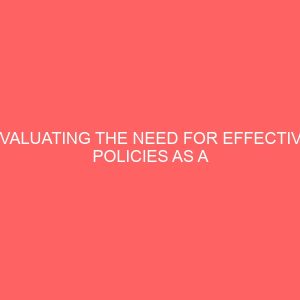
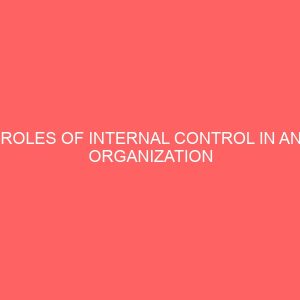
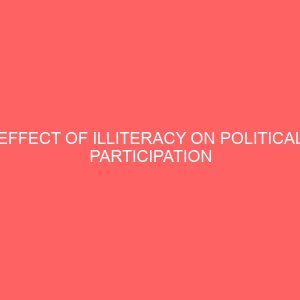

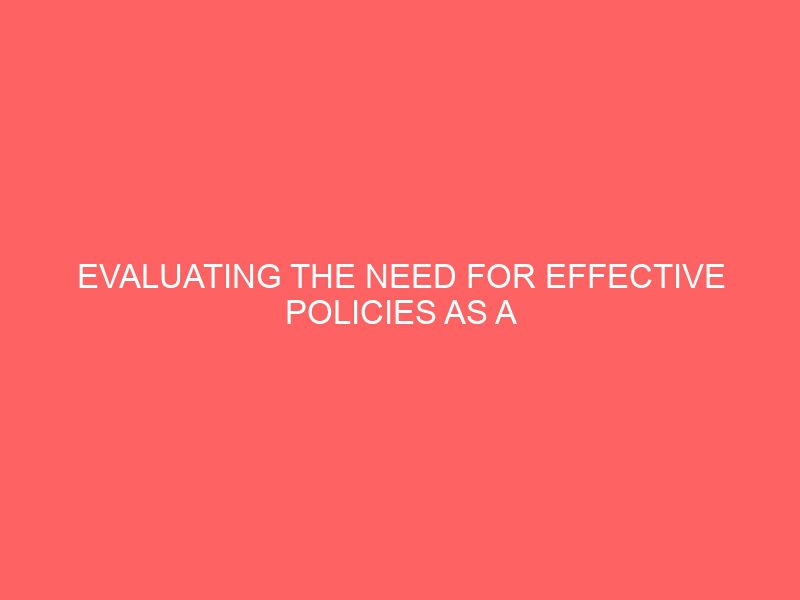
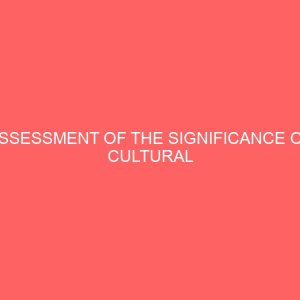

Abiola –
Projectslib has never disappointed before. You pay and then you get what you paid for delivered to you. No delay, no stories. Great work guys.